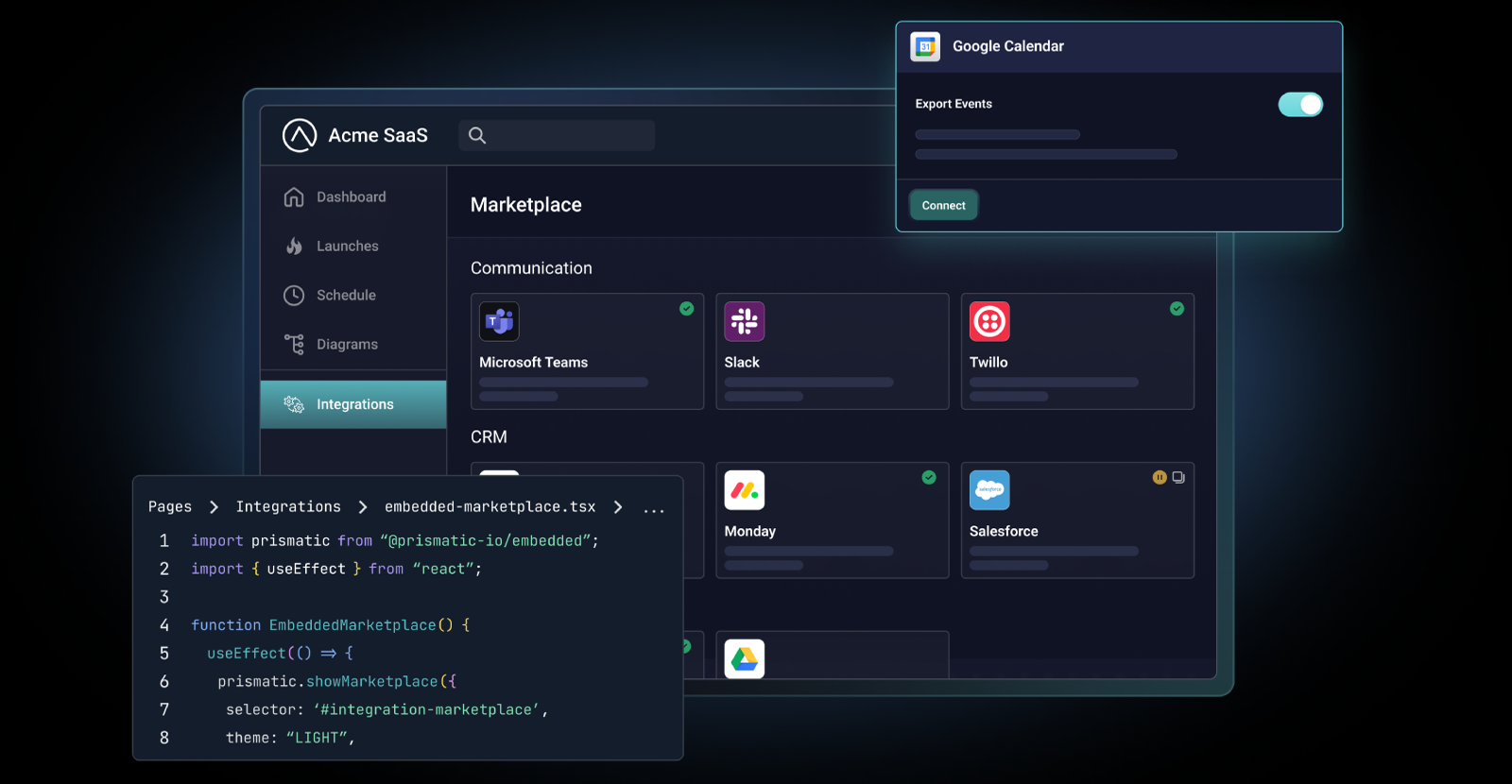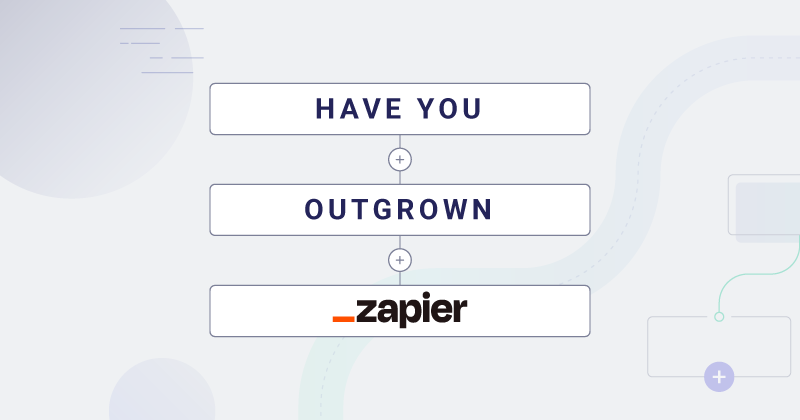What are the differences between Prismatic and Zapier?
Zapier’s embedded option is a version of the company’s automation workflow tool. The company provides a means for devs to build connectors via code, but that’s the only custom coding allowed. Zapier supports minimal branching (and other complexity), often restricting connector functionality to less than what is available via a given API.
Zapier | |||
|---|---|---|---|
| Low-code integration designer | |||
| Embedded integration marketplace | |||
| Pre-built connector library | |||
| Custom connector SDK | Full Node.js environment | HTTP-only low-code custom connector builder | |
| Embedded workflow builder for end users | |||
| Granular versioning control of integrations and their connectors | |||
| Complete customer management console environment | |||
| 100% of application functionality available via API | |||
| Designed to fit into existing CI/CD workflows | |||
| Command line interface (CLI) | |||
| Dev-friendly docs with code examples in GitHub repository | |||
| Self-service support tools for logging and alerting | |||
| Flexible cloud deployments | |||
- Low-code integration designer
- Embedded integration marketplace
- Pre-built connector library
- Custom connector SDKFull Node.js environment
- Embedded workflow builder for end users
- Granular versioning control of integrations and their connectors
- Complete customer management console environment
- 100% of application functionality available via API
- Designed to fit into existing CI/CD workflows
- Command line interface (CLI)
- Dev-friendly docs with code examples in GitHub repository
- Self-service support tools for logging and alerting
- Flexible cloud deployments
- Zapier
- Low-code integration designer
- Embedded integration marketplace
- Pre-built connector library
- Custom connector SDKHTTP-only low-code custom connector builder
- Embedded workflow builder for end users
- Granular versioning control of integrations and their connectors
- Complete customer management console environment
- 100% of application functionality available via API
- Designed to fit into existing CI/CD workflows
- Command line interface (CLI)
- Dev-friendly docs with code examples in GitHub repository
- Self-service support tools for logging and alerting
- Flexible cloud deployments

Prismatic beautifully supports the model we wanted: technical support staff configure new instances of known integrations; software engineers get involved when there's something new; support staff can monitor what's happening day-to-day. Meanwhile, we can focus engineering cycles on adding value for our customers.


With Prismatic, we're able to deliver integrations in far less time while streamlining our engineering effort. Prismatic has given us the ability to more widely build integrations across our teams. It has also allowed our customer-facing teams to handle customer-specific deployment.


Prismatic has been a game-changer for our team. The platform's intuitive low-code builder, marketplace and robust monitoring capabilities allow us to deliver complex integrations faster and more reliably than ever before. Whether quickly wiring up an integration using pre-built components or developing custom logic, Prismatic gives us the flexibility we need.


We probably save 95% of engineering time; we've deployed far more integrations than we would have without Prismatic. Everyone gets it; everyone understands that we can integrate wherever we need to, and that's quite a powerful thing.


The speed to market, the development costs, the ease of usability, the variety of integrations, the ability to customize it, and then also make a seamless marketplace. It's the whole package. Prismatic has changed the game, certainly 100% for us.


We've been able to see a roughly 50% increase in new customer acquisition simply by that factor of reducing time on our maintenance. My development team can now focus on new integrations and new automations.


After evaluating numerous embedded iPaaS vendors, Prismatic emerged as the clear leader for scaling customer integrations. Their comprehensive toolset not only enables access to diverse data sources but empowers our customers to build, deploy, and manage their own integrations with confidence.


Prismatic has enabled FMX to be efficient, consistent, and reliable in our integrations with third party systems. Prismatic has quickly become the clear choice for all facets of our integration strategy, including the migration of current integrations from previous solutions. We are pleased to mention our partnership with Prismatic when discussing system integration with prospects, customers, and other solution providers.


Prismatic beautifully supports the model we wanted: technical support staff configure new instances of known integrations; software engineers get involved when there's something new; support staff can monitor what's happening day-to-day. Meanwhile, we can focus engineering cycles on adding value for our customers.


With Prismatic, we're able to deliver integrations in far less time while streamlining our engineering effort. Prismatic has given us the ability to more widely build integrations across our teams. It has also allowed our customer-facing teams to handle customer-specific deployment.


Prismatic has been a game-changer for our team. The platform's intuitive low-code builder, marketplace and robust monitoring capabilities allow us to deliver complex integrations faster and more reliably than ever before. Whether quickly wiring up an integration using pre-built components or developing custom logic, Prismatic gives us the flexibility we need.


We probably save 95% of engineering time; we've deployed far more integrations than we would have without Prismatic. Everyone gets it; everyone understands that we can integrate wherever we need to, and that's quite a powerful thing.


The speed to market, the development costs, the ease of usability, the variety of integrations, the ability to customize it, and then also make a seamless marketplace. It's the whole package. Prismatic has changed the game, certainly 100% for us.


We've been able to see a roughly 50% increase in new customer acquisition simply by that factor of reducing time on our maintenance. My development team can now focus on new integrations and new automations.


After evaluating numerous embedded iPaaS vendors, Prismatic emerged as the clear leader for scaling customer integrations. Their comprehensive toolset not only enables access to diverse data sources but empowers our customers to build, deploy, and manage their own integrations with confidence.


Prismatic has enabled FMX to be efficient, consistent, and reliable in our integrations with third party systems. Prismatic has quickly become the clear choice for all facets of our integration strategy, including the migration of current integrations from previous solutions. We are pleased to mention our partnership with Prismatic when discussing system integration with prospects, customers, and other solution providers.


Prismatic beautifully supports the model we wanted: technical support staff configure new instances of known integrations; software engineers get involved when there's something new; support staff can monitor what's happening day-to-day. Meanwhile, we can focus engineering cycles on adding value for our customers.


With Prismatic, we're able to deliver integrations in far less time while streamlining our engineering effort. Prismatic has given us the ability to more widely build integrations across our teams. It has also allowed our customer-facing teams to handle customer-specific deployment.


Prismatic has been a game-changer for our team. The platform's intuitive low-code builder, marketplace and robust monitoring capabilities allow us to deliver complex integrations faster and more reliably than ever before. Whether quickly wiring up an integration using pre-built components or developing custom logic, Prismatic gives us the flexibility we need.


We probably save 95% of engineering time; we've deployed far more integrations than we would have without Prismatic. Everyone gets it; everyone understands that we can integrate wherever we need to, and that's quite a powerful thing.


The speed to market, the development costs, the ease of usability, the variety of integrations, the ability to customize it, and then also make a seamless marketplace. It's the whole package. Prismatic has changed the game, certainly 100% for us.


We've been able to see a roughly 50% increase in new customer acquisition simply by that factor of reducing time on our maintenance. My development team can now focus on new integrations and new automations.


After evaluating numerous embedded iPaaS vendors, Prismatic emerged as the clear leader for scaling customer integrations. Their comprehensive toolset not only enables access to diverse data sources but empowers our customers to build, deploy, and manage their own integrations with confidence.


Prismatic has enabled FMX to be efficient, consistent, and reliable in our integrations with third party systems. Prismatic has quickly become the clear choice for all facets of our integration strategy, including the migration of current integrations from previous solutions. We are pleased to mention our partnership with Prismatic when discussing system integration with prospects, customers, and other solution providers.

Prismatic is purpose-built for B2B SaaS
Zapier, however, is focused on workflow automation. Its product is intended to support the use case of a user who needs to connect Common App A with Common App B. While the company’s embedded offering attempts to broaden the platform’s appeal to B2B SaaS companies that need to build many integrations for their customers, it falls short of providing needed features and functionality.
Zapier | |||
|---|---|---|---|
| Low-code integration designer | |||
| White-labeled integration marketplace | |||
| Code-native integrations | |||
- Low-code integration designer
- White-labeled integration marketplace
- Code-native integrations
- Zapier
- Low-code integration designer
- White-labeled integration marketplace
- Code-native integrations
Own the integration relationship
When your customers have an issue or a need or want to do anything else with integrations, they contact your support or customer success teams.
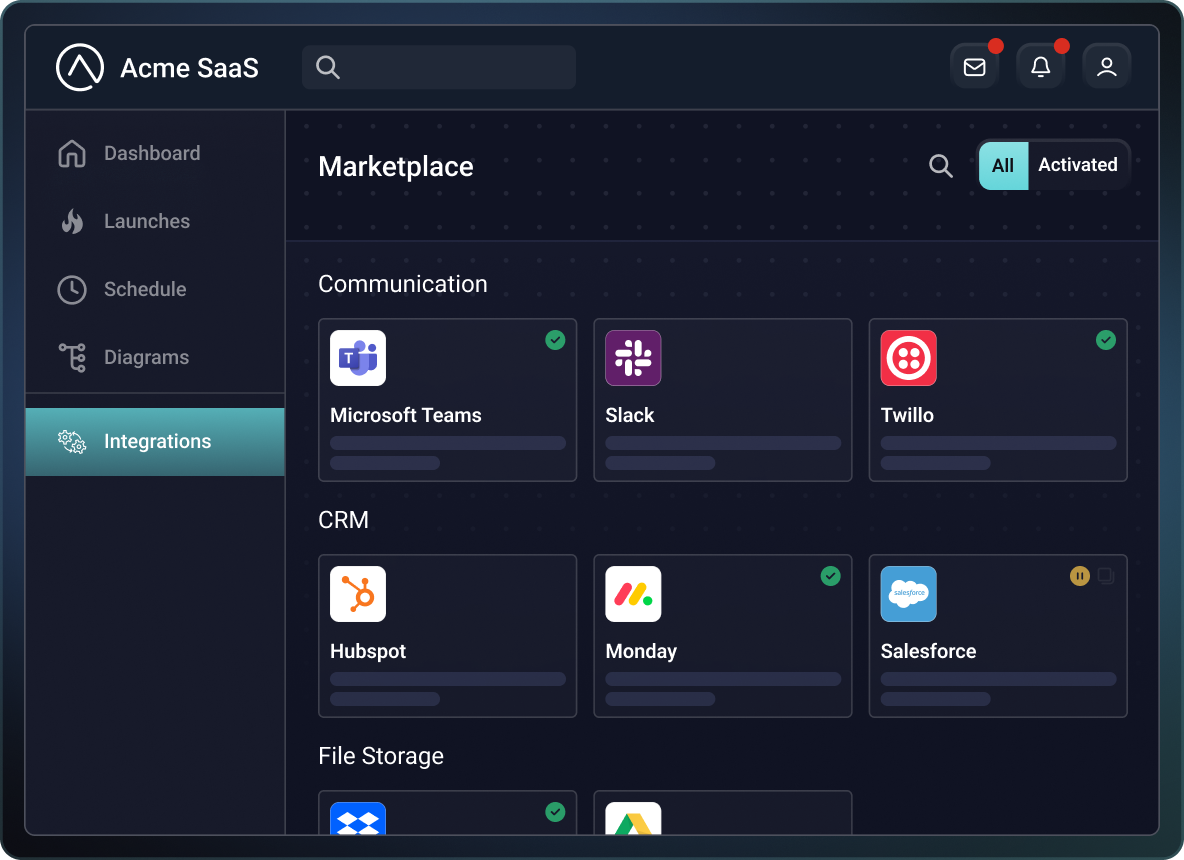
Instead of giving it to Zapier
When something goes wrong, your customers contact Zapier support for issue resolution. When your customers use more than a certain number of integration tasks (actions) in a month, Zapier bills them accordingly.
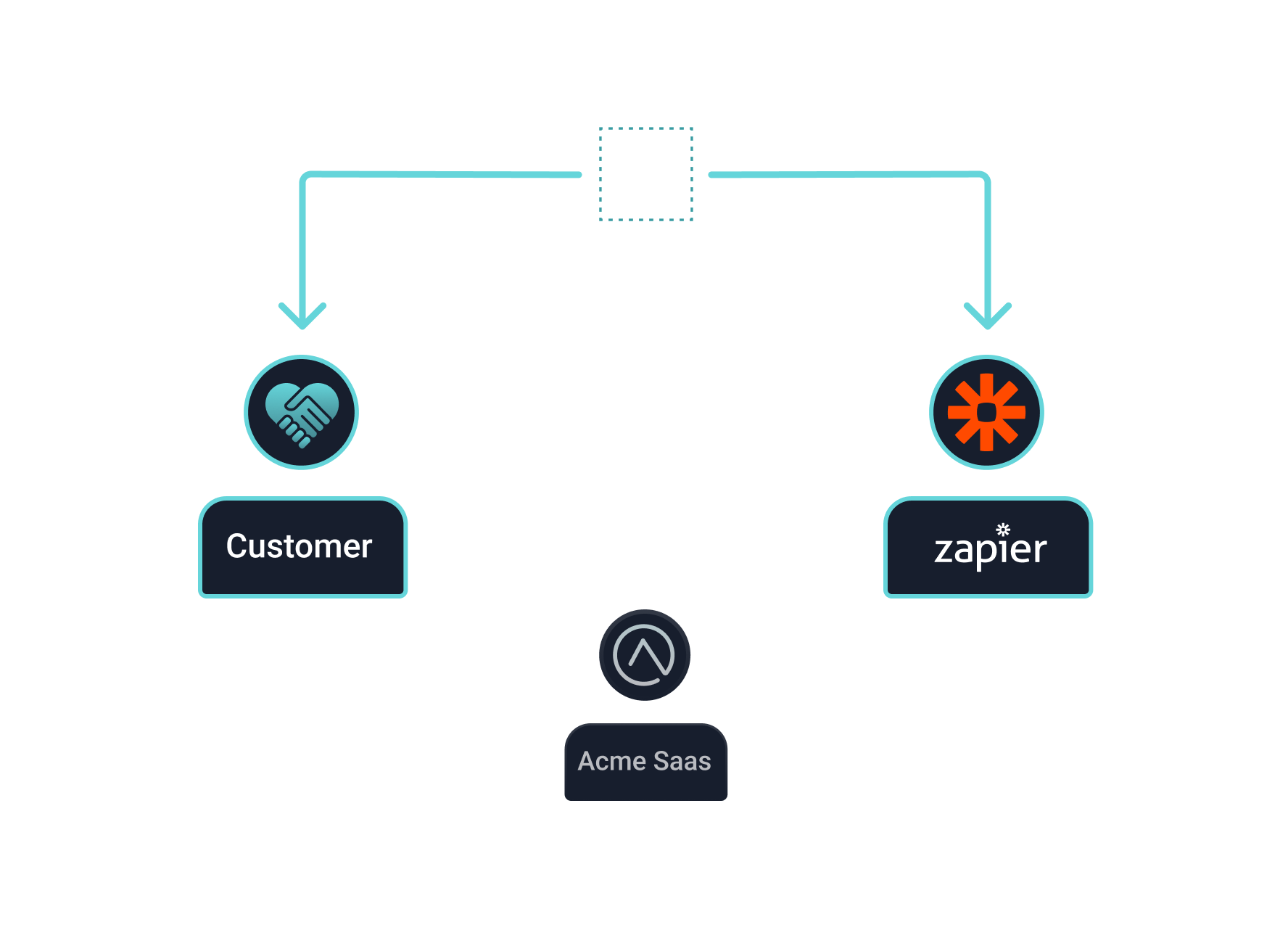
Prismatic allows code and handles complexity
Prismatic's code-native integration building experience is no less powerful. Devs can use their favorite IDEs with the code-native integrations SDK to build entire integrations in code.
Zapier is designed for non-technical users to hook two apps together without knowing much about what's happening below the surface. As a result, Zapier does not support code-native development. Your devs can write code for new connectors, but that's it – no other areas allow for the inclusion of custom code (whether directly or via a code library), and your devs definitely can't write entire integrations in code.
Zapier | |||
|---|---|---|---|
| Custom code | |||
| Custom connectors | |||
| Integration branches | No limit | Up to 3 | |
| Code-native integrations | |||
- Custom code
- Custom connectors
- Integration branchesNo limit
- Code-native integrations
- Zapier
- Custom code
- Custom connectors
- Integration branchesUp to 3
- Code-native integrations
Make integrations easy for your users
In addition, Prismatic provides its embedded workflow builder so you can empower your customers to create integrations. You can focus on the integrations that have broad appeal across your customer base while ensuring that your customers still have the one-off, custom integrations that are uniquely important to them.
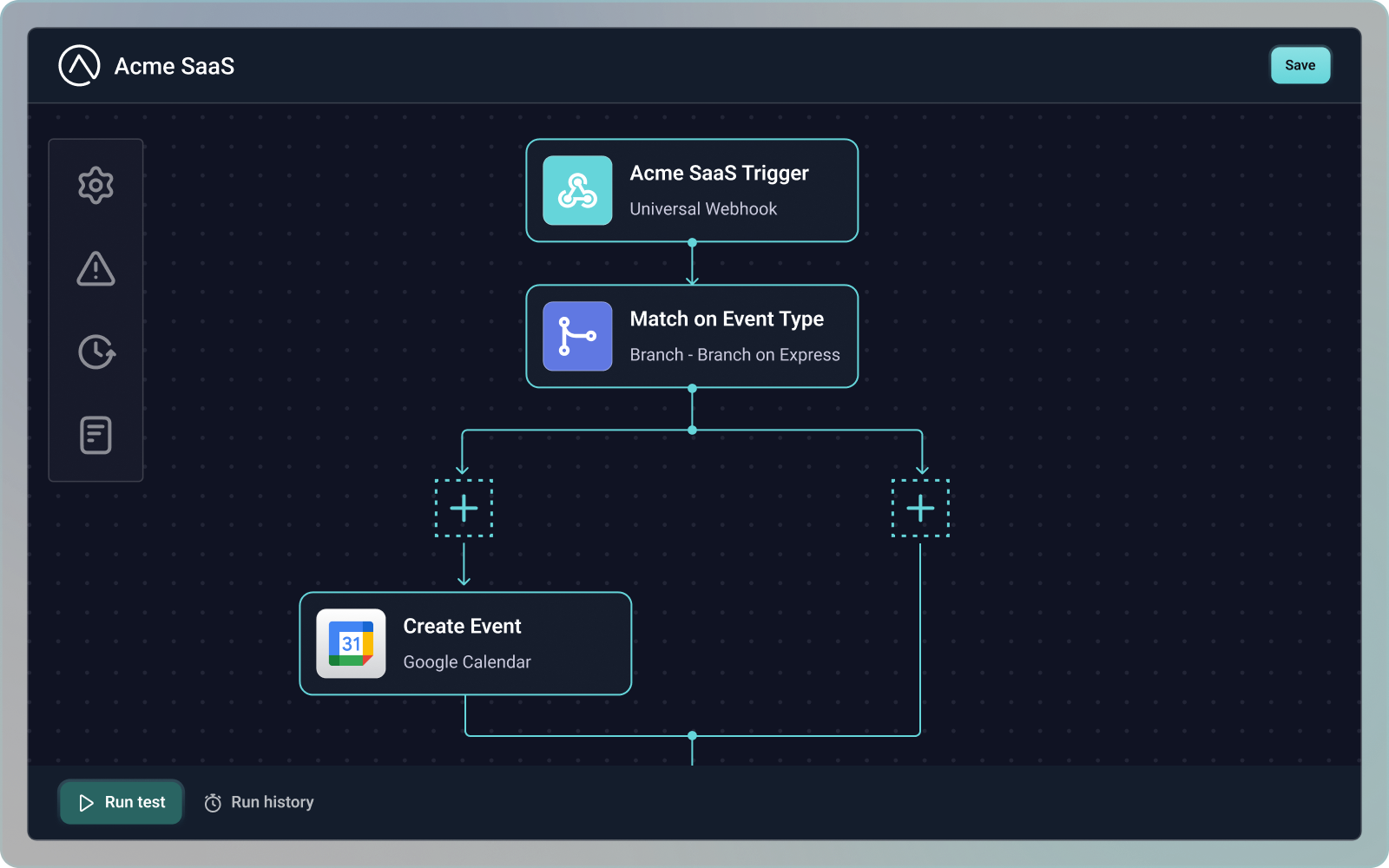
Instead of creating unneeded work
The platform also requires end-users to do final assembly of integrations. That is, you built a connector for your app, and placed it into an integration template, but the end users must add actions to the template before activating that integration for their use. You don’t have the option of simply turning integrations on for each customer.
And, after your devs make substantial changes to your app’s connector, each of your customers must rebuild any integration which uses that connector.
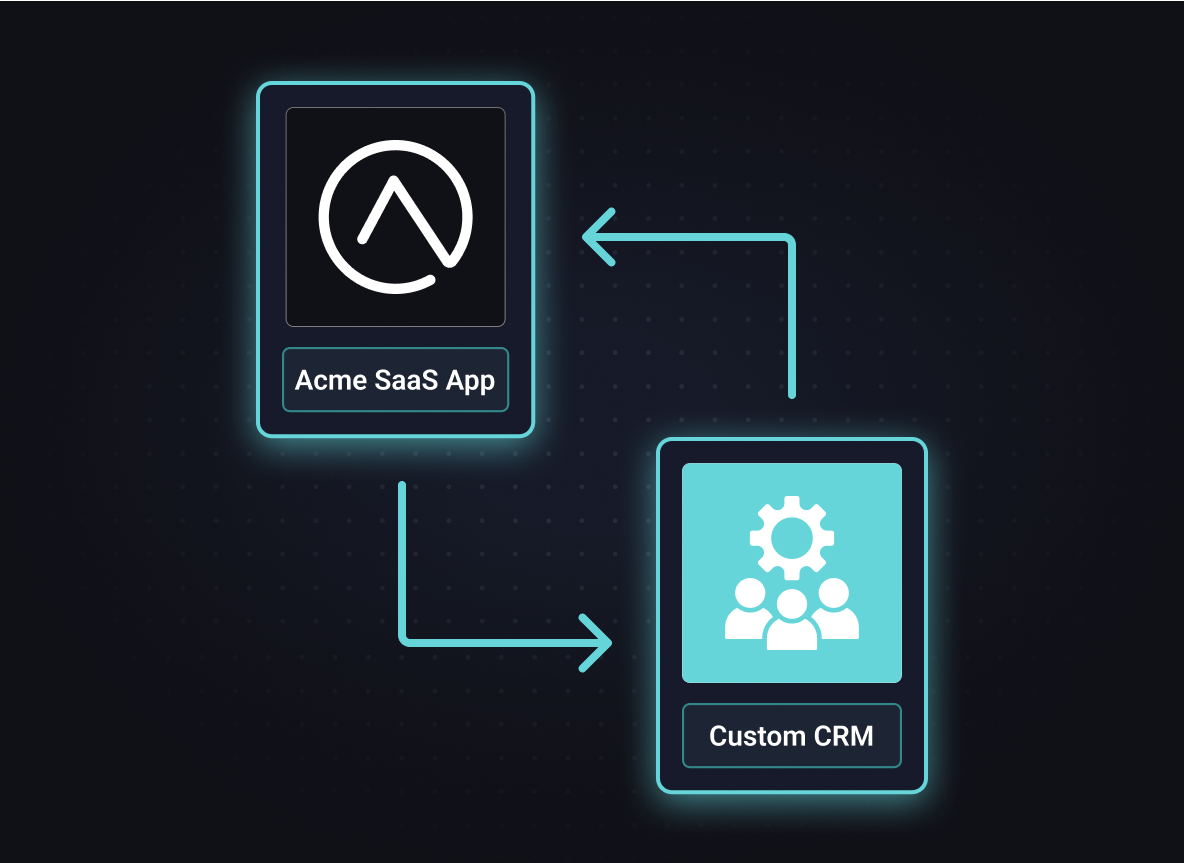
Pricing for Prismatic vs Zapier
Zapier | |||
|---|---|---|---|
| Pricing tiers | Includes three tiers: Pro, Scale, and Enterprise. | Includes four tiers: Free, Professional, Team, and Enterprise. | |
| Pricing fees | Monthly fee, with additional costs for specific functionality, and a cost per instance (integration + customer). | A monthly fee and additional costs for tasks (each action an integration completes successfully). | |
| Pricing benefits/drawbacks | Lets you quickly determine how your costs will grow as customers and integrations increase. | Requires that customers directly contract with Zapier for access to your integrations. As a B2B SaaS company, you’ll join Zapier’s partner program to gain the ability to publish connectors or templates to Zapier’s platform that your customers can then use in their integrations. | |
- Pricing tiersIncludes three tiers: Pro, Scale, and Enterprise.
- Pricing feesMonthly fee, with additional costs for specific functionality, and a cost per instance (integration + customer).
- Pricing benefits/drawbacksLets you quickly determine how your costs will grow as customers and integrations increase.
- Zapier
- Pricing tiersIncludes four tiers: Free, Professional, Team, and Enterprise.
- Pricing feesA monthly fee and additional costs for tasks (each action an integration completes successfully).
- Pricing benefits/drawbacksRequires that customers directly contract with Zapier for access to your integrations. As a B2B SaaS company, you’ll join Zapier’s partner program to gain the ability to publish connectors or templates to Zapier’s platform that your customers can then use in their integrations.
What users say about Prismatic and Zapier
Zapier customers mention that the platform has connections for many common apps but also note that support is an issue. Few reviews address the embedded integration use case needed by B2B SaaS companies.
For more details from G2 on how Prismatic compares to Zapier and other embedded iPaaS, check out the most current quarterly G2 Grid Report.
"Being a lifelong engineer for high-scale applications, it's hard to relinquish the desire to build everything myself. Prismatic has created an incredibly powerful and flexible platform, built off scalable technologies, so you don't have to."
"Prismatic has been a joy to work with as a developer. The tool itself is clearly organized and offers a flexible outlook on code structure easily adaptable to a wide variety of integrations and use cases."
"I found Prismatic to be very straight forward to use and easy to code for. The team has a wealth of knowledge and made it easy to support what we were aiming for. The documentation is extensive and covers many use cases, giving step by step instructions or general solutions to common integration problems."
"Since using this platform for a few years I can still say it's amazing! The recent release of code native has also elevated our ability to craft exactly the integrations we want and was very exciting for our engineers. The integrations our team builds can be very complex, which code native allows us to build to."
"Prismatic is easy to use and supports a wide variety of integrations and most of these can be written with little or no coding knowledge, the documentation is very good and the highlight of all is the support team, they are very knowledgeable and they always answer the questions to the point and in the simplest way possible."
"Being a lifelong engineer for high-scale applications, it's hard to relinquish the desire to build everything myself. Prismatic has created an incredibly powerful and flexible platform, built off scalable technologies, so you don't have to."
"Prismatic has been a joy to work with as a developer. The tool itself is clearly organized and offers a flexible outlook on code structure easily adaptable to a wide variety of integrations and use cases."
"I found Prismatic to be very straight forward to use and easy to code for. The team has a wealth of knowledge and made it easy to support what we were aiming for. The documentation is extensive and covers many use cases, giving step by step instructions or general solutions to common integration problems."
"Since using this platform for a few years I can still say it's amazing! The recent release of code native has also elevated our ability to craft exactly the integrations we want and was very exciting for our engineers. The integrations our team builds can be very complex, which code native allows us to build to."
"Prismatic is easy to use and supports a wide variety of integrations and most of these can be written with little or no coding knowledge, the documentation is very good and the highlight of all is the support team, they are very knowledgeable and they always answer the questions to the point and in the simplest way possible."
"Being a lifelong engineer for high-scale applications, it's hard to relinquish the desire to build everything myself. Prismatic has created an incredibly powerful and flexible platform, built off scalable technologies, so you don't have to."
"Prismatic has been a joy to work with as a developer. The tool itself is clearly organized and offers a flexible outlook on code structure easily adaptable to a wide variety of integrations and use cases."
"I found Prismatic to be very straight forward to use and easy to code for. The team has a wealth of knowledge and made it easy to support what we were aiming for. The documentation is extensive and covers many use cases, giving step by step instructions or general solutions to common integration problems."
"Since using this platform for a few years I can still say it's amazing! The recent release of code native has also elevated our ability to craft exactly the integrations we want and was very exciting for our engineers. The integrations our team builds can be very complex, which code native allows us to build to."
"Prismatic is easy to use and supports a wide variety of integrations and most of these can be written with little or no coding knowledge, the documentation is very good and the highlight of all is the support team, they are very knowledgeable and they always answer the questions to the point and in the simplest way possible."
Wrapping up
Though Zapier has attempted to enter the B2B SaaS market, it is not built to solve the B2B SaaS integration use case. The platform is focused on direct-to-user implementations and does not have the processes and tooling to support B2B SaaS companies that want to provide integrations for their customers while fully owning those customer relationships.
Get a demo to see how Prismatic can enable a white-labeled integration marketplace and everything else you need to provide a first-class integration experience for your customers.







